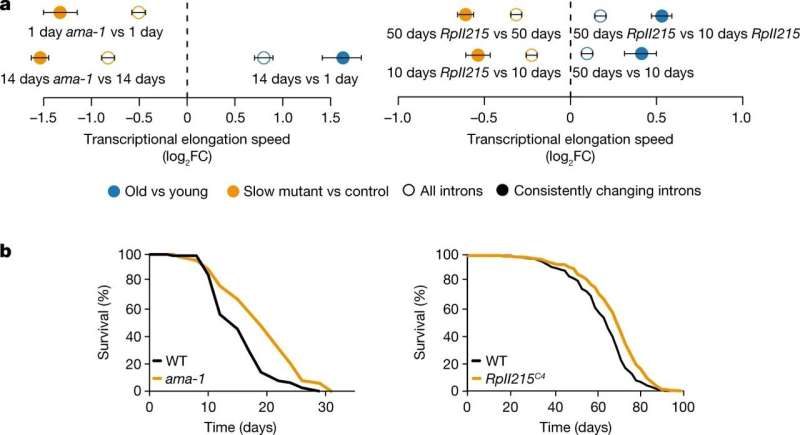This article has been reviewed according to Science X's editorial process and policies. Editors have highlighted the following attributes while ensuring the content's credibility:
fact-checked
peer-reviewed publication
trusted source
proofread
Study shows genes are read faster and more sloppily in old age

Fast but sloppy, that's how the transcription of genes changes with age. Six research groups from the University of Cologne Cluster of Excellence on Cellular Stress Responses in Age-Associated Diseases (CECAD), the Max Planck Institute for Biology of Aging (MPI) in Cologne and the University of Göttingen discovered a new molecular mechanism that contributes to aging by studying the transcription process in five different model organisms and in a wide variety of tissues.
Aging impairs a wide range of cellular processes, many of which affect the quality and concentration of proteins. Among these processes, the reading of genes known as transcription is particularly important, because it is a main regulator of protein levels.
Although experts knew that gene expression, i.e. the conversion of genetic information into proteins, changes with age, and also that the control of gene expression may be impaired, it was unclear whether the accuracy of the transcription process itself changes with age and whether such a change would have relevant consequences for organisms.
This is exactly what the researchers have now been able to demonstrate, which makes Andreas Beyer, CECAD working group leader and professor at the Institute for Genetics of the Faculty of Mathematics and Natural Sciences at the University of Cologne, extremely happy: "This was a large, collaborative project lasting several years involving multiple teams from the CECAD cluster and other scientific institutions. Data from five species had to be generated and analyzed. Only by combining our expertise was it possible to study so many species and types of data."
In fact, the 26 scientists investigated genome-wide, age-related changes in transcription processes in nematodes, fruit flies, mice, rats and humans, including diverse tissues. And they discovered that the average speed at which the transcript grows through the attachment of RNA building blocks, the nucleotides, increased with age in all five species.
Together with the higher speed of this elongation speed (Pol II speed), the researchers also observed changes in the so-called splicing, a further work step within the transcription process from the gene to the finished protein, in which the transcription product is once again shortened and cut to size.
However, the accuracy of the entire transcription process could also be controlled and reversed, for example by dietary restriction or intervention in insulin signaling—both measures that contribute to the extension of lifespan, as has been known for many years. Similarly, the lifespan of flies and the division potential of human cells lengthened when the researchers used interventions to reduce the reading speed.
Professor Beyer says, "Our results uncover fundamental molecular mechanisms underlying animal aging and interventions to extend lifespan, providing clues as to how we might contribute to healthy aging in the future. The fact that interventions, such as a reduced calorie intake, also have a positive effect on a healthy aging process on the molecular level via improving the quality of gene transcription is something which we have now been able to prove quite clearly with our study."
The paper is published in the journal Nature.
More information: Cédric Debès et al, Ageing-associated changes in transcriptional elongation influence longevity, Nature (2023). DOI: 10.1038/s41586-023-05922-y
Journal information: Nature
Provided by University of Cologne





















